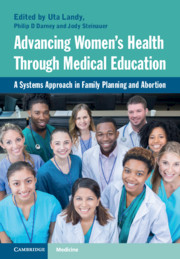 Advancing Women's Health Through Medical Education
Advancing Women's Health Through Medical Education Book contents
- Advancing Women’s Health Through Medical Education
- Reviews
- Advancing Women’s Health Through Medical Education
- Copyright page
- Dedication
- Contents
- Contributors
- Preface
- Acknowledgments
- Introduction
- Section I Abortion Training: Workforce, Leadership, Social & Political Impact
- Section II Integration of Abortion into Graduate Medical Education
- Section III Family Planning Curricular Design & Implementation
- Chapter 17 A Guide for Creating a Program in Sexual and Reproductive Health-Care Education
- Chapter 18 Creating and Implementing a Curriculum for Reproductive and Sexual Health Training Programs
- Chapter 19 Assessing Competence in Family Planning Skills through Milestones
- Chapter 20 Educating and Mentoring Medical Students in Family Planning
- Chapter 21 The Role of Students in Advocating for Training in Sexual and Reproductive Health Care
- Chapter 22 The Role of Simulation in Sexual and Reproductive Health-Care Training
- Chapter 23 The Benefits of and Strategies for Supporting Residents’ Partial Participation in Abortion Training
- Chapter 24 Stigma and Abortion Care
- Chapter 25 Emotional Support
- Section IV Reproductive Health Services & Abortion Training: Global Examples
- Index
- References
Chapter 20 - Educating and Mentoring Medical Students in Family Planning
from Section III - Family Planning Curricular Design & Implementation
Published online by Cambridge University Press: 30 July 2021
- Advancing Women’s Health Through Medical Education
- Reviews
- Advancing Women’s Health Through Medical Education
- Copyright page
- Dedication
- Contents
- Contributors
- Preface
- Acknowledgments
- Introduction
- Section I Abortion Training: Workforce, Leadership, Social & Political Impact
- Section II Integration of Abortion into Graduate Medical Education
- Section III Family Planning Curricular Design & Implementation
- Chapter 17 A Guide for Creating a Program in Sexual and Reproductive Health-Care Education
- Chapter 18 Creating and Implementing a Curriculum for Reproductive and Sexual Health Training Programs
- Chapter 19 Assessing Competence in Family Planning Skills through Milestones
- Chapter 20 Educating and Mentoring Medical Students in Family Planning
- Chapter 21 The Role of Students in Advocating for Training in Sexual and Reproductive Health Care
- Chapter 22 The Role of Simulation in Sexual and Reproductive Health-Care Training
- Chapter 23 The Benefits of and Strategies for Supporting Residents’ Partial Participation in Abortion Training
- Chapter 24 Stigma and Abortion Care
- Chapter 25 Emotional Support
- Section IV Reproductive Health Services & Abortion Training: Global Examples
- Index
- References
Summary
The chapter outlines the skills required to provide basic family planning care: contraceptive counseling; pregnancy options counseling; advocacy; screening for pregnancy intention, intimate partner violence and reproductive coercion; furthering of professional identity formation; and ethical reasoning. It describes justifications for their inclusion in medical school curricula. To increase the likelihood that the required knowledge and skills will not only be taught but also learned by all graduates, family planning educators need to join other educators in medical education reform, specifically the movement toward outcomes-based education, programmatic assessment and the fluent adoption of active-learning strategies. They should also continue to expand exposure to the more advanced skills required for abortion and contraception as to enhance student learning of basic skills, and positively impact attitudes toward patients and providers. Finally, it reviews meaningful opportunities for mentoring students and providing the role-modeling that nurtures respect for and interest in the field.
Keywords
- Type
- Chapter
- Information
- Advancing Women's Health Through Medical EducationA Systems Approach in Family Planning and Abortion, pp. 202 - 210Publisher: Cambridge University PressPrint publication year: 2021
